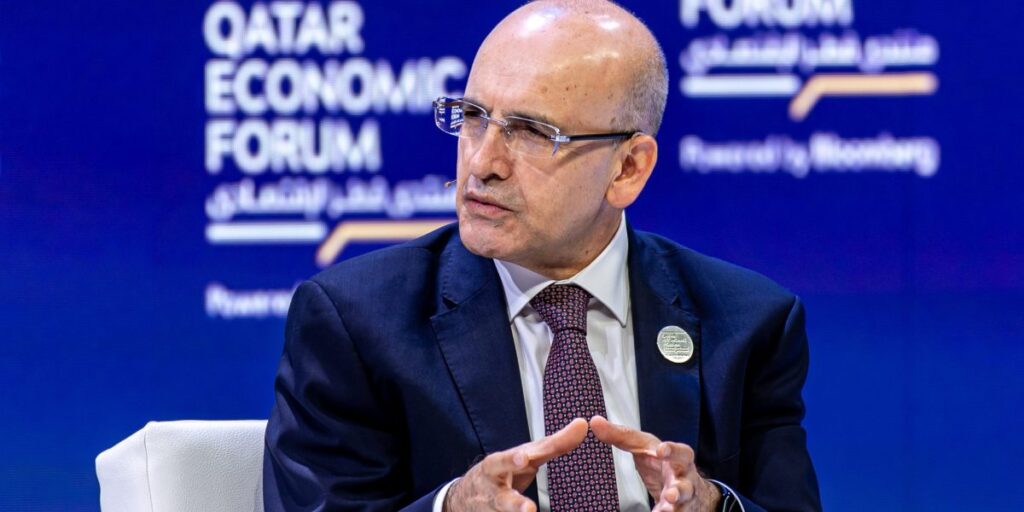Mehmet Simsek’s argument is simple: after a period of economic adventurism and crisis, “rational” policies have returned to Turkey, and Turkish lira debt should be a solid investment for global asset managers.
It took nearly a year of some of the world’s most aggressive rate hikes for the finance minister, a former Merrill Lynch & Co. bond strategist, to get the message across to investors.Turkey still has a long way to go, with inflation at nearly 70% and expected to rise again this month.
But most foreign investors are now convinced that price growth will slow sharply by the end of 2024. Locals are also more optimistic, and many of them have moved funds from dollars to lira accounts, helping to cushion some of the Turkish currency’s decline this year.
“We are overwhelmed by the amount of money coming in,” Simsek, 57, said in an interview in Ankara.
The bond market had been largely abandoned by outsiders as President Recep Tayyip Erdogan’s push to cut interest rates led to soaring inflation, but Turkey’s reelection a year ago and the subsequent appointment of Simsek reversed course and foreign capital inflows have recently reached a record pace.
Turkey is putting the inflows to good use by buying dollars to replenish depleted coffers: The central bank’s primary foreign-exchange reserves have risen by $49 billion since March, the biggest increase on record, according to Goldman Sachs Group Inc.
Turkey is using the windfall to fund its reserves to avoid what Simsek says is an excessive appreciation of the lira, which has fallen about 8 percent this year, and he wants to prevent it from rising too much in the future, which would hurt Turkish exporters.
“The combination of sound policies and structural reforms is a good story for restoring investor confidence,” Simsek said. “And that can help portfolio preferences in favor of Turkish assets, which can lead to inflows and contribute to stabilizing the real exchange rate.”
Banks such as BNP Paribas are encouraging investors to buy short-term lira bonds, which offer yields of about 40%. Simsek isn’t averse to the inflow of so-called hot money — Erdogan has long blamed it for destabilizing the now $1.1 trillion economy — but he sees a shift to longer-term bonds as just a matter of time.
“Our program doesn’t rely on hot money,” he said, adding that he would be “very surprised if investors weren’t taking duration risk” on longer-term bonds.
Portfolio inflows into Turkish assets have exceeded $25 billion since the end of March, nearly triple the amount in the previous five months, according to QNB Bank of Finland.
As foreign purchases increased, about a fifth of the total flowed into domestic bonds, most of it in “short-term repo-type instruments,” Bank of Turkey said in a report. The rest, it estimated, was used to invest in carry trades in the Turkish lira, which offers higher yields.
Turkey’s carry trade has been one of the best performing trades for emerging-market investors this year, as investors who borrowed in dollars and invested in the Turkish lira have made gains of more than 11%, according to data compiled by Bloomberg, as high yields on local government bonds more than made up for the lira’s decline.
Still, the truce with portfolio investors won’t be complete until inflation starts to slow and Turkey eases restrictions on offshore currency swaps needed to hedge exposure to the lira. Those restrictions have been used to stabilize the lira.
The restrictions date back to 2018, when Turkey reduced the amount of lira commercial banks were allowed to lend to foreign banks following the currency crisis.
Simsek said Turkey was exploring ways to deregulate its offshore markets, possibly starting with longer-term swaps. “We know what needs to be done, but the timing, sequence and amount have not been decided yet,” he said.
“A Renaissance Moment”
Positive market sentiment around Turkey has led Wall Street banks such as Citigroup to declare the country is “on the brink of a renaissance moment,” but the momentum of domestic reforms will remain a focus for investors.
Even after an aggressive rate-hiking cycle, inflation remains among the highest in the world and is likely to peak at around 75 percent this month before beginning to slow over the summer.
With inflation among the world’s highest, investors are watching to see whether Turkey will rein in spending or at least end the big annual tax hikes that have characterized recent years. Fitch Ratings said Turkey’s fiscal stance remains “clearly expansionary” despite some public spending cuts announced by Simsek in May.
But four years without a major election gives government officials like Simsek a chance to cool the economy without paying an immediate cost at the polls.
“We are still in the early stages of implementation,” he said, referring to efforts to broaden the tax base and combat the shadow economy. “I’m not saying we’ve addressed all the challenges, but we’ve made a lot of progress.”
–With assistance from Tugce Ozsoy.
Subscribe to the CFO Daily newsletter to stay up to date on the trends, issues and executives shaping corporate finance. Sign up for free.
Source link


